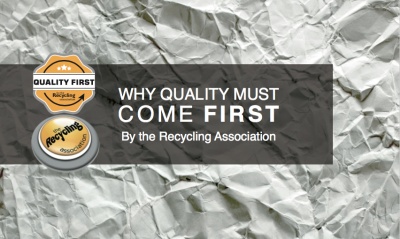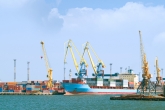Recycling Association calls for supply chain responsibility in Quality First report
Whole supply chain responsibility and is on the agenda for the Recycling Association in its new report on the Quality First Campaign, one year on from its launch last September.
The report, launched yesterday (12 September) at RWM 2017 in Birmingham, lays out how the Recycling Association believes the quality of UK material collected for recycling can be improved, while also acknowledging where progress has been achieved and how the Quality First campaign has pushed that.
The report urges a whole supply chain approach to improving quality, an issue all the more pertinent given current external market pressures such as China’s import ban on certain materials due to high levels of contamination, with every part of the supply chain taking responsibility to ensure that a product is recycled at the end of its life.

With the UK exporting some 14 million tonnes of scrap materials worth £3.5 billion, and with 3.6 million tonnes of paper (out of 4.9 million tonnes collected) being sent to China, it is crucial that the UK recycling industry gets quality right if it wants to retain access to overseas markets for scrap materials.
The report proposes a range of actions to improve the quality of UK recyclate. These are:
- Taking a whole supply chain approach - more engagement is needed throughout the supply chain involving all stakeholders to create a unified approach to quality, with each part taking responsibility;
- Improving packaging design - the Recycling Association calls on the UK government to adopt the EU Circular Economy Package despite Brexit to act as a framework for the implementation of new regulations on packaging design and as a platform for extending producer responsibility;
- Funded consumer communications campaigns - producers should be encouraged to help fund communications campaigns, possibly through a collective budget funded by a reformed Packaging Recovery Note (PRN) system;
- More intelligent regulation - more funding should be provided to crack down on waste crime, a global export standards for paper should be implemented, while a ‘lighter touch’ to regulation should be applied to compliant companies; and
- Building new strategic partnerships - the Recycling Association will seek new partnerships, as well as build on existing partnerships, to maximise the reach of the Quality First message.
Quality 'right at the top of the agenda'
Speaking to Resource about the Quality First campaign, Recycling Association Chief Executive, Simon Ellin, said: “I think it’s been a fantastic success. There are very few times now, if you were to open a trade magazine or go onto a website related to the resources and waste industry, that you wouldn’t find quality mentioned – it’s now right at the top of the agenda.
“I think the big message in the Quality First campaign is that we’ve got to improve the quality of materials that we’re supplying in a global context because global markets are changing. We predicted that as China’s economy grew, as China’s own green agenda grew, that they would be looking for less material from the Western world. What we didn’t expect was for that to happen quite so quickly, and one of the messages of Quality First is that we’ve got to be the Armani of Europe and not the Primark of Europe. We’ve got to be seen by China as preferred suppliers. We’ve got to prove to them that we can provide them with the material that they want.”
And Ellin is adamant that the responsibility for improving quality lies at the door of every stakeholder in the supply chain - from the producer, to the consumer, to the local authority, to the government. Identifying packaging such as Pringles pots, made of multiple materials rendering them difficult to recycle, as evidence of poor supply chain planning for what happens at the end of a product’s life, Ellin continues: “Right at the beginning of this supply chain, you’ve got to get it right and take responsibility. If you don’t, it will cost you a lot of money. I think the government needs to say ‘this is not good enough’ and these companies have to pay for the materials they are producing. Responsibility has got to come in.
“One thing we’ve got to get away from is this ‘head in the sand’ approach where you’re passing the buck. The designers pass the buck to the general public, the general public don’t understand what they’re doing so they chuck everything in the wrong bin, and then the local authorities pass the buck to the waste management companies and say ‘it’s your mess, you’ve got to sort it out’. That’s got to stop.”
In light of China’s decision to prevent the import of numerous materials, including all post-consumer plastics and contaminated mixed papers, Ellin believes this could be the spur needed for the UK to realise new investment in its own facilities is needed: “We can campaign and we can lobby as much as we like, but one thing that will change it is market forces. If local authorities suddenly discover there is no market for their material, overnight they will be forced to up their game. But they must have government support.
“Let’s not be so utterly reliant on China, let’s make our own investment in our own processing facilities. What sort of economy is the UK when we are processing in terms of paper, less than 40 per cent of what we collect? It’s down to lack of investment in UK infrastructure and UK markets and that’s been going on for decades.”
Where is the vision?
One way the UK government could help the local authorities and businesses trying to improve quality and using recycled materials would be to adopt the EU Circular Economy Package, expected to come into force before the UK’s mooted March 2019 departure date. In light of recent government stasis on waste and resources policy, the package could provide a platform for the UK to come up with its own forward-thinking policy framework.
Ellin adds: “What I would love to happen is that we adopt the CEP as a framework and use it as a platform to then come up with our own visionary and properly funded approach including everyone in the supply chain that produces tangible results.
“But the government must take the lead. Why don’t we implement fiscal penalties for irresponsible producers? Why don’t we have VAT breaks for companies using recyclable materials? Using government legislation to stimulate the market internally through redistributing the money in the system that benefits, tangibly, those who are purporting to be carbon neutral, that are producing goods that have net carbon benefits - that’s what we need, and we need it now.”
It is also incumbent on the government, according to Ellin, to start getting people to change their behaviour towards recycling, to make it a way of life, just another thing that needs to be done, as opposed to a chore inflicted on them by ‘the council’.
As local authorities’ communications budgets have been hollowed out in recent years, the money has to come from somewhere, with the Recycling Association suggesting a collective budget funded by a reformed PRN system or shared responsibility between local authorities and waste management companies in renegotiated contracts, which will require decisive and visionary action from the government, rather than seemingly ad hoc policy-making as has been seen in the past.
Ellin concludes: “We had, a few years ago, Eric Pickles and his £200m community fund and he just campaigned to go back to weekly collections. All of a sudden this £200m the government managed to find was completely frittered away on one man’s personal crusade. That £200m could have gone on a TV advertising campaign, so when you’re watching Coronation Street it seeps in, its subliminal, telling people how to recycle and it’s done on a loop 365 days a year and then that becomes part of our culture.
“But it takes a bit of vision, of funding, some clever work in the taxation system, in the EPR system, in the PRN system and if it’s not done, we are at a crisis point in our industry, and that is what Quality First addresses and will continue to address.”
You can read more about quality issues in UK recycling and China’s crackdown on imports of foreign waste in the article ‘Could the Chinese export ban lead to a great leap forward for British recycling?’ in Resource 89.







